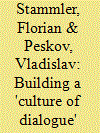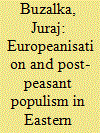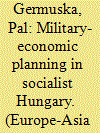| Srl | Item |
| 1 |
ID:
082478


|
|
|
|
|
| Publication |
2008.
|
| Summary/Abstract |
This article analyses the development of relations between indigenous communities, oil companies and the state in Russia's Nenets Autonomous Okrug (NAO). Using first hand information from anthropological fieldwork and one co-author's own involvement in regional politics, we analyse efforts to establish stakeholder dialogue. We show that 'collective agency' is crucial to prepare the ground for trustful relations, whereas high personnel turnover within interest groups jeopardises initially promising initiatives. Lessons from this experience have relevance for similar analyses throughout Russia in those cases where consistent federal and regional legislation is not likely to be in place in the near future
|
|
|
|
|
|
|
|
|
|
|
|
|
|
|
|
| 2 |
ID:
082476


|
|
|
|
|
| Publication |
2008.
|
| Summary/Abstract |
This article examines the direct impact of Europarties on domestic party development, taking the case of Bulgaria when it was a European Union (EU) candidate country. It combines arguments from party theory and the Europeanisation literature and focuses on the overlap of these two fields of study and it investigates the direct impact of Europarties on the choice of electoral strategies made by political parties in candidate states. The study begins by proposing an analytical model that explains the electoral behaviour of political parties based on traditional propositions in comparative party studies. Then it proposes to view international impact as an additional constraint on that behaviour. The main argument is that, in certain situations, Europarties have intervened in domestic party politics and have played a role in the decision of parties to choose certain electoral strategies. It is suggested therefore, that viewing party electoral behaviour purely from the perspective of domestic politics would not only be misleading, but would also lead us to expect behaviour that might not have been a possible alternative for the parties at a given point in time.
|
|
|
|
|
|
|
|
|
|
|
|
|
|
|
|
| 3 |
ID:
082474


|
|
|
|
|
| Publication |
2008.
|
| Summary/Abstract |
On the basis of an examination of rural social structure, traditionalist narratives and an agrarian imaginary resulting from uneven development, this article investigates the forms of political mobilisation which materialise in East European politics as 'post-peasant populism'. Focusing on grassroots mobilisation, an analysis of the annual Corpus Christi ritual in the city of Przemy?l, south-east Poland, serves as the basis for an exploration of the theme of socially sensitive post-peasant populism as an alternative to post-socialist capitalism. This populism relies on the politicisation of the rural past and is currently influenced by 'Europeanisation'
|
|
|
|
|
|
|
|
|
|
|
|
|
|
|
|
| 4 |
ID:
082475


|
|
|
|
|
| Publication |
2008.
|
| Summary/Abstract |
This article explores the question of moral discourse among Russian political elites. Morality is reflected in elite narratives in various forms-as an espousal of abstract principles, as a moral-pragmatic hybrid, and as loyalty to one's associates. Proximity to political power correlates with the various versions of moral discourse employed by elite members. Each version, respectively, offers an index of social relations through the prism of morality: in some instances, negatively, as that which prevents the attainment of the good; in others, problematically, as that which makes difficult that attainment; and in a third version, that which contributes to securing the good itself
|
|
|
|
|
|
|
|
|
|
|
|
|
|
|
|
| 5 |
ID:
082477


|
|
|
|
|
| Publication |
2008.
|
| Summary/Abstract |
This article analyses the institutional framework of military-economic and defence industrial planning in Hungary in the Socialist period. At the beginning of the 1950s the Soviet military planning system was mechanically adopted in Hungary and during the Korean War a system of general mobilisation was developed, and the whole economy was militarised. Although some limitations were introduced into this structure in the following years, it was only in the 1960s that the planning methods and apparatus were reorganised and modernised. It was at this time that the implications of atomic war were brought into the considerations of the planning office, resulting in radical change.
|
|
|
|
|
|
|
|
|
|
|
|
|
|
|
|
| 6 |
ID:
082473


|
|
|
|
|
| Publication |
2008.
|
| Summary/Abstract |
This article explores the contentious 'monetisation' of in-kind benefits (l'goty) that converted them into cash allowances and redistributed responsibility for welfare provision between federal and local governments. We provide an empirical account of these reforms and discuss their implications for the conceptualisation, financing and regional dimensions of welfare provision in Russia. We find that budgetary pressures were not the primary motivation for the recent changes, nor were old forms of social provision fully abolished. Monetisation launched a process that shifts responsibility for well-being onto individuals and institutionalises the spatial differentiation of welfare provision.
|
|
|
|
|
|
|
|
|
|
|
|
|
|
|
|
| 7 |
ID:
082472


|
|
|
|
|
| Publication |
2008.
|
| Summary/Abstract |
The article reports on an attempt to assess recent developments of the Russian 'virtual economy', a system that, some have argued, represents an alternative form of economic interaction to the modern market economy. In the virtual economy enterprises are engaged in informal non-market transactions with other enterprises and the public sector in accordance with rules that are alien to a market economy. Structural and behavioural changes that have taken place in the Russian economy after 1998 are studied with the help of official data and two surveys (from 1998 and 2005) of 15 forest sector enterprises in Arkhangel'sk Oblast', a region in Russia's north-west with a largely forest-based economy. The outcome of the assessment indicates that the virtual economy is contracting in the Arkhangel'sk forest sector as well as in Russia at large, and that it will eventually disappear altogether, even if it is likely to exert a profound influence on the behaviour of Russian enterprises for some time yet.
|
|
|
|
|
|
|
|
|
|
|
|
|
|
|
|